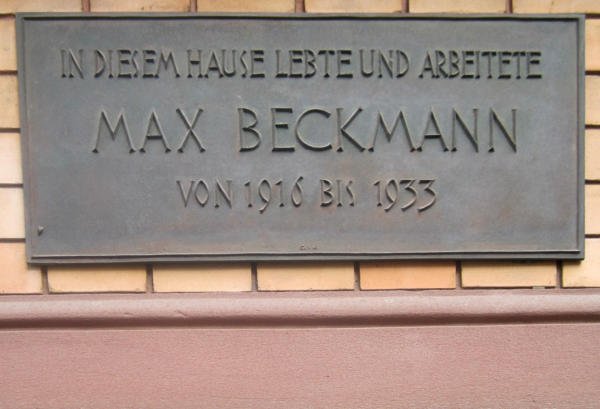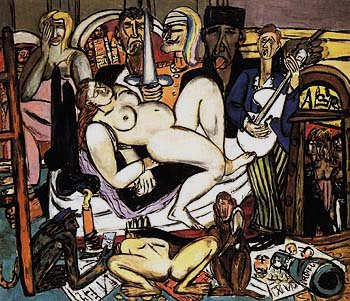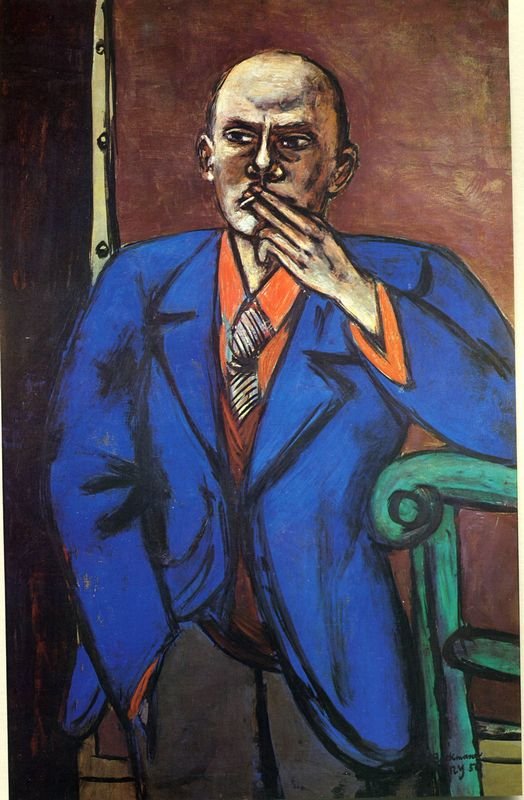Life
Max Beckmann was born February 12, 1884, in Leipzig, Germany. He began to study art at the Grossherzogliche Kunstschule, Weimar, in 1900 and made his first visit to Paris in 1903–04. During this period, Beckmann began his lifelong practice of keeping a diary, or Tagebuch. In the fall of 1904 he settled in Berlin. In 1912 the artist’s first solo shows took place at the Kunstverein, Magdeburg, and the Grossherzogliches Museum für Kunst und Kunstgewerbe, Weimar. He volunteered for the German army medical corps in 1914, but was discharged for reasons of health the following year and settled in Frankfurt.

In 1925 Beckmann’s work was included in the Neue Sachlichkeit exhibition at the Städtisches Kunsthalle, Mannheim, and he was appointed professor at the Städelsches Kunstinstitut, Frankfurt. His first show in the United States took place at J. B. Neumann’s New Art Circle, New York, in 1926. A large retrospective of his work was held at the Städtisches Kunsthalle, Mannheim, in 1928. From 1929 to 1932 he continued to teach in Frankfurt but spent time in Paris during the winters. It was in these years that Beckmann began to use the triptych format. When the Nazis came to power in 1933, Beckmann lost his teaching position and moved to Berlin. In 1937 his work was included in Entartete Kunst, the Nazi exhibition of so-called “degenerate art.” The day after the show opened in July in Munich, the artist left Germany for Amsterdam, where he remained until 1947. In 1938 he had the first of numerous exhibitions at Curt Valentin’s Buchholz Gallery, New York.Beckmann traveled to Paris and the south of France in 1947 and later that year went to the United States to teach at the School of Fine Arts at Washington University, Saint Louis. The first Beckmann retrospective in the United States took place in 1948 at the City Art Museum, Saint Louis. The artist taught at the University of Colorado, Boulder, during the summer of 1949 and the following fall at the Brooklyn Museum Art School. That year the artist was awarded first prize in the exhibition Painting in the United States, 1949 at the Carnegie Institute, Pittsburgh. He died on December 27, 1950, in New York.
(source: https://www.guggenheim.org/artwork/artist/max-beckmann)
Art Work
During the late 1920s, Max Beckmann (1884–1950) was at the pinnacle of his career in Germany; his work was presented by prestigious art dealers, he taught at the Städel Art School in Frankfurt, and he moved in a circle of influential writers, critics, publishers, and collectors. After the National Socialists labeled his works "degenerate" and confiscated them from German museums in 1937, Beckmann left the country and immigrated to Holland, where he remained for 10 years. In 1947, he accepted a temporary teaching position in St. Louis, Missouri, and in September 1949, he moved to New York City, which he described as "a prewar Berlin multiplied a hundredfold." Life in Manhattan energized him and resulted in such powerful pictures as Falling Man (1950) and The Town (City Night) (1950).

In late December 1950, Beckmann set out from his apartment on the Upper West Side of New York to see his Self-Portrait in Blue Jacket (1950), which was on view at The Metropolitan Museum of Art in the exhibition American Painting Today. However, on the corner of 69th Street and Central Park West, the 66-year-old artist suffered a fatal heart attack and never made it to the Museum. The poignant circumstance of the artist's death served as the inspiration for this exhibition.

(source: http://www.metmuseum.org/exhibitions/listings/2016/max-beckmann)
Max Beckmann's works are on exhibition in major international museums such as the Frankfurt Städel Museum, Guggenheim and the Met.
If you are interested in German arts and literature see also @german-trail for Famous German Writers.
